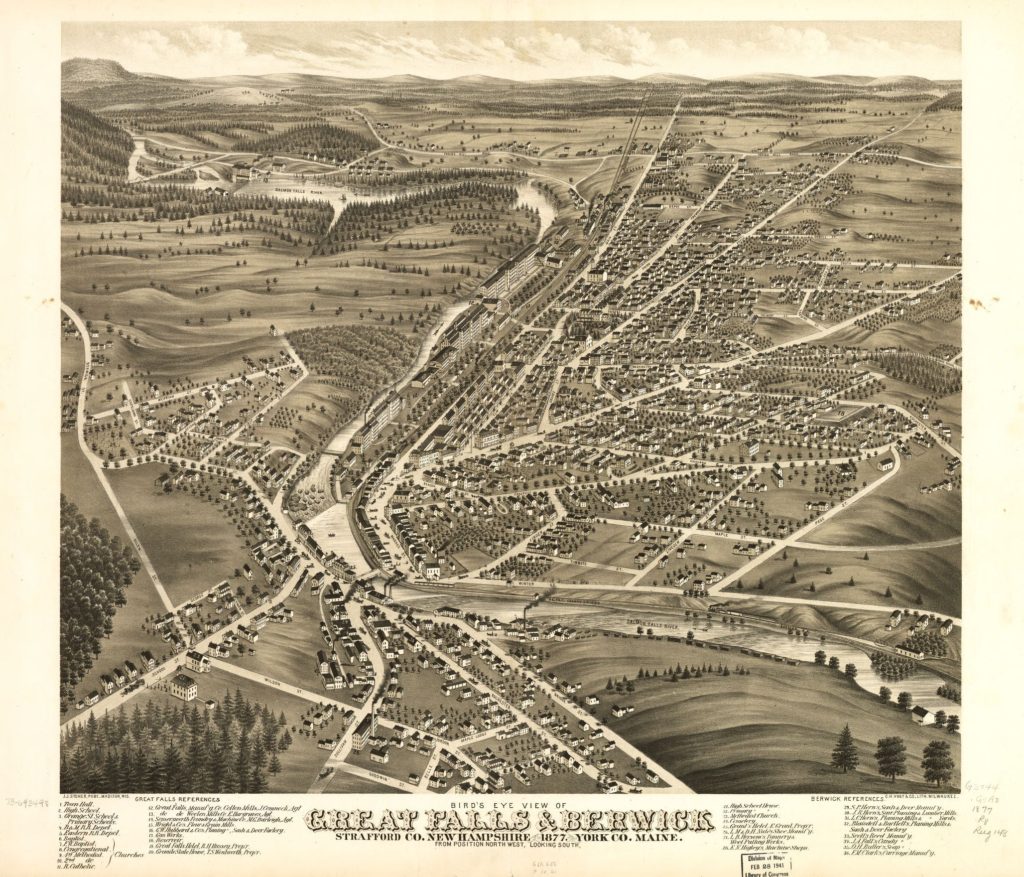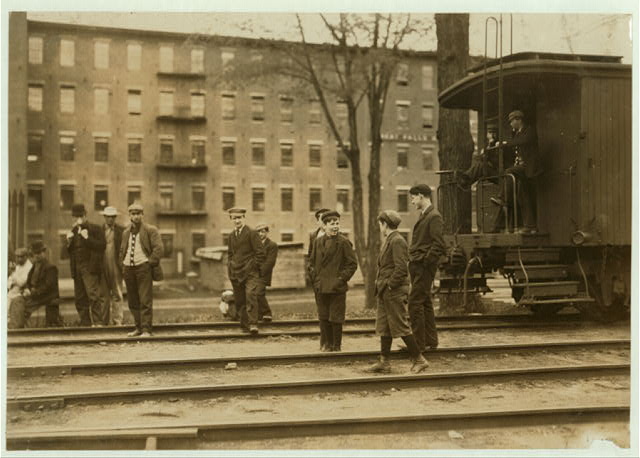Testimony of Emory J. Randall, shareholders’ clerk of the Great Falls Manufacturing Company (in present-day Somersworth), before the U.S. Senate Committee Upon the Relations Between Labor and Capital, Manchester, N.H., October 15, 1883.
Randall estimated that the combined population of Great Falls [Somersworth], N.H., and Berwick, Maine amounted to 7,200-7,500 residents. All of the mills on the New Hampshire side belonged to the Great Falls Manufacturing Company, with a workforce of about 2,100.
“[W]ithout knowing exactly, my acquaintance with the operatives would lead me to believe that about 60 per cent. are French Canadians, and the other 40 about equally divided between Scotch, Irish, and American . . . I think that our population does not differ materially in its character from what you will find in any New England manufacturing town of the same class . . . The general tendency of the French-Canadian population—at least that has been my observation—is to the larger towns. The country mill is generally a graduating school for the city mill. The French population of our place, for instance, has a tendency towards the larger towns, and I think that is so everywhere. The peculiar characteristics of the French are a desire to live in large settlements; they like show, and the accommodations and societies which they have in the large cities rather than the country. So that I think, if the facts could be obtained, Manchester, for instance, as being the representative town of New Hampshire in this line of business, would probably show that it was made up very largely of people who have come to it from the smaller towns. I think that the new hands, for instance, who come from Canada come oftener to the smaller towns at first than directly to large towns. So I should say that in the country mills the French-Canadian population would not average quite as well as they would in the larger towns—that is, they have not been in the country so long.

“A great many of our people are direct from Canada, and of course they come to the States in many cases—in fact in all cases—to benefit their condition. Heretofore in our own community the Canadian has come with no fixed purpose to remain. I am talking now of the larger proportion of the people. The French-Canadians heretofore have come to our place with the purpose of going back to Canada to stock the little farms which they own there, or to remain in our communities or such larger places as they may drift to, like Manchester or Lowell, until they shall have money enough to stock their farms and improve their condition at home. That I think is being changed somewhat in our own community at present. There are two parishes down our way, one for the English-speaking and one for the French-speaking Catholics. One is in charge of Father Doody, an Irishman, and the French portion is in charge of Father Dumas, a very faithful man. They are now building a new church, and since that movement has been in progress the tendency of the French people has been to look about them for homes, and there are quite a number of French people there now who are buying homes for themselves, so that the outlook at the present is that we shall have a more fixed population than heretofore. They are providing in that church that is now being built a very large room to accommodate two or three hundred, which they propose to use for a parochial school, and to prepare, I presume, the younger portions of their families for the duties of the church. Our agent, Captain Shaw, is very much alive to the importance of the education of these people, and so are the priests.”
Randall then offered a picture of overall labor peace in Great Falls. He indicated that his company paid the same amount as mills in Biddeford–Saco and Manchester, to prevent the best workers from moving to those larger centers. He noted that the company owned tenements predominantly inhabited by the Canadians. The looming creation of a parochial school was not expected to siphon children from the public schools, but rather to provide education to a segment of the population that so far had remained apart. Asked about the “desirability” of the French Canadians, Randall explained:
“I think they are a very good class of people. Of course they differ entirely in many of their characteristics from the Irish and American, but they are apt and quick to learn and very smart workers. They are not so constant, however . . . I do not think they are nearly so frugal as the Americans or Irish. I think they spend their money more freely for show and for dress. They are a more pleasure-seeking people than either the Irish or the American, in my judgment; that is, from my observation of them. They could not be called a dissipated class of people, however. Of course among our mill operatives we have some people that would be called dissipated . . . [A]s a rule, the French Canadian that comes to the States, or the Scotchman who comes from Glasgow, adopts the mill business in a very large measure, because his family is particularly adapted to that line of business. A man who has six or seven daughters, as is frequently the case, and two or three sons, will naturally come to the States, and the girls will make good wages in the mill . . . [The money] supports the family, and in a very large number of cases they send the residue to Canada.”

The committee then called Rev. William MacDonald, an Irish Catholic priest, who proceeded to berate the committee for entering New Hampshire to investigate a local matter. A spirited constitutional back-and-forth ensued with the chair of the committee, New Hampshire’s own Senator Henry W. Blair.
Great post, Patrick. My great-grandfather and great-grandmother were the first to move to the states and they moved to Salmon Falls, south and downstream from Great Falls in the 1880’s. As Randall pointed out, they did indeed move on – in their case to Lawrence MA sometime between 1903-1910. My guess is for a better job, my ggf was a loom fixer.
“I do not think they are nearly so frugal as the Americans or Irish.” I might give the NH Yankees the nod on frugality, but the Irish? I love my Irish friends, and maybe their ancestors were frugal back in the day, but frugal is not a word that pops into my head when I think about them.